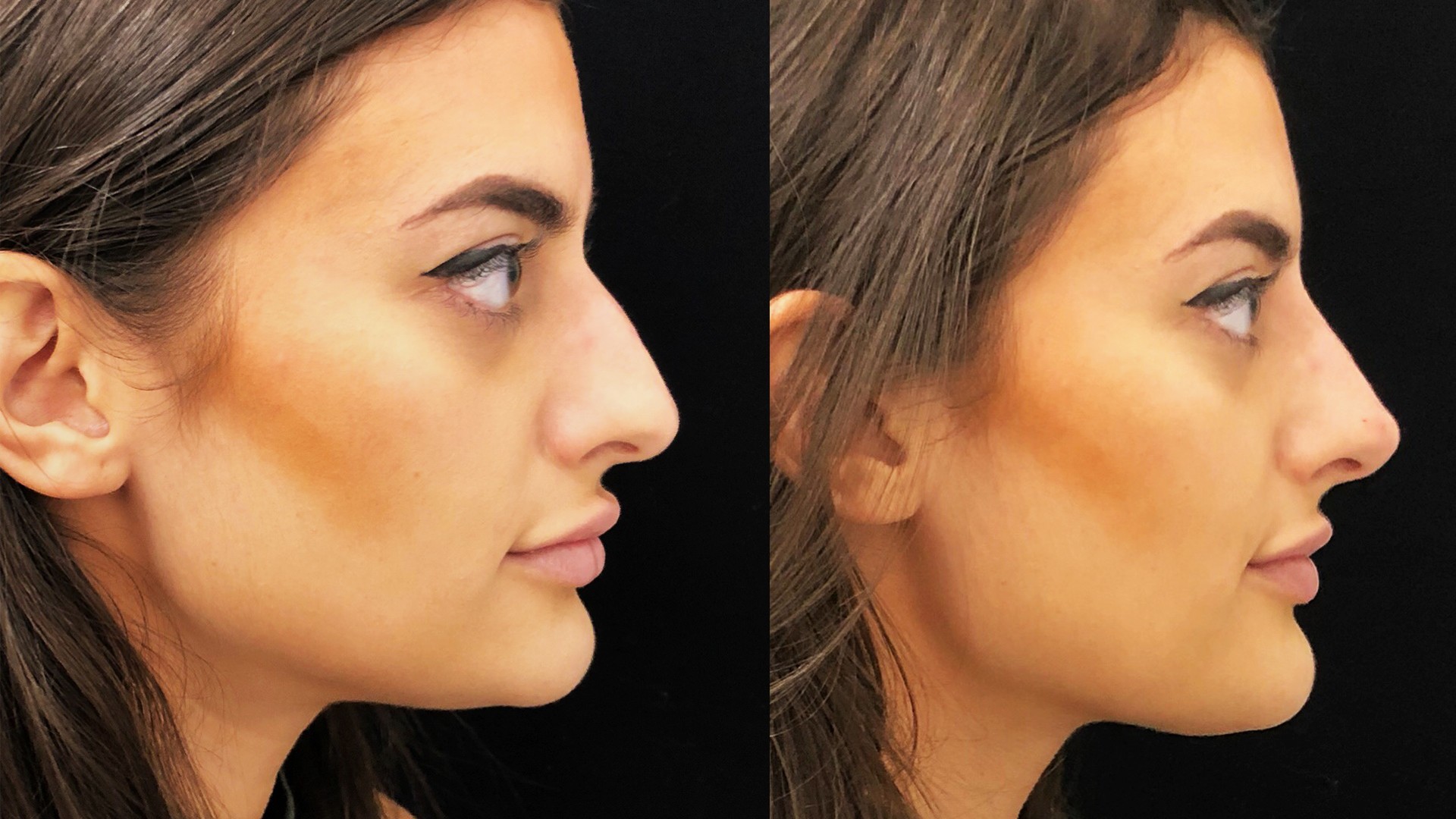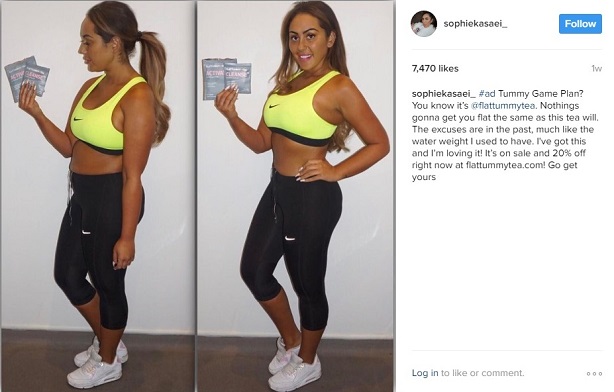Illustration by Grace Wilson
There is a belief, parroted in comment sections across the internet, that people who get scammed by influencers somehow deserve it. From the rich kids who spent $12,000 on Fyre Festival tickets to the young women who believe Kylie Jenner’s hair is shiny because of bear-shaped gummy vitamins, people who fall for influencer marketing are often lambasted as “idiots” or worse.This assumption ignores the reality of a highly effective industry. The global influencer market hit $1.07 billion in 2017, and according to a 2018 report by Business Insider, adverts posted by influencers get double the engagement than adverts posted on Instagram by brands themselves. Over the last decade, social media marketing has gone mainstream—yet although we talk a lot about influencers, we hear very little from the influenced themselves.“Of course I feel like an idiot now,” says Alysia Stevenson, a 27-year-old from New York who bought SkinnyMint detox tea three years ago, after seeing multiple Instagram adverts featuring “before and after” pictures posted by reality TV stars.“I’ve always had body image issues, and I kind of saw [the tea] as something quick and easy, and they looked so happy and healthy,” she says. Yet within days of starting her two-week tea-tox, Stevenson began experiencing health issues, including going to the toilet “multiple times a day.”
Watch: I Got Surgery to Look Like My Snapchat and Facetune Selfies “I was just miserable,” she says. “On the third day, I became nauseous. I was getting like cold sweats. I was convulsing, going to the bathroom constantly.” Although her boyfriend told her to stop drinking the tea, Stevenson wouldn’t. “I was just so determined to see the number on the scale go down after two weeks, I didn’t care that I was getting sick.”SkinnyMint did not respond to a request for comment, but on its official website FAQs, the brand states: “SkinnyMint is made from completely natural ingredients however, everybody is different and therefore can react differently to these ingredients.” Less encouragingly, under the question “Will I get diarrhea?”, the website states:Stevenson’s experiences illustrate how the influencer industry preys on insecure women. Kylie Jenner—who is reportedly paid up to $1 million for a single Instagram post—regularly advertises diet teas to her 126 million followers. But you don’t have to be a die-hard fan who trusts everything an influencer shills to be taken in—it’s enough to be a young woman with an internet connection.“I saw Flat Tummy Tea everywhere on Instagram,” says Daisy, a 27-year-old from Michigan who requested to be identified by a pseudonym because of her eating and dieting issues. At first unconvinced by the adverts that flooded her feed, Daisy spent $160 on the tea when Keisha (a.k.a. Makeup Doll)—an influencer with 231,000 Instagram followers and 650,000 YouTube subscribers—posted a review with an affiliate link and exclusive discount code to buy the tea.This means Keisha received $10 every time someone purchased the tea with her code, as part of Flat Tummy Tea’s ambassador program. While American and English advertising practices now mean influencers have to label affiliate marketing as #ad, these rules were only put in place in 2017, a year after Keisha’s YouTube video. She did not respond to request for comment.“I never take celebrity endorsements seriously because I figure they are compensated for their time—in my mind she wasn’t a celebrity,” Daisy explains. Like Stevenson, Daisy experienced laxative effects from the tea. She began using it to binge and purge, calling it a “reset button” that allowed her to “poop out mistakes.”“I knew if I drank the Cleanse tea, I would go to the bathroom, which meant the binge didn’t count,” she says. “I felt like crap with the extended use… but at that point, the tea was my crutch.” Flat Tummy Tea did not respond to a request for comment, but much like SkinnyMint, its website FAQ section declares “No, it shouldn’t have you running to the bathroom” and “There shouldn’t be any crazy side effects.” The website states under-18s should ask a parent before purchasing the product, and also says “Yes, you can and should keep on eating normally while drinking Flat Tummy Tea.”
“I was just miserable,” she says. “On the third day, I became nauseous. I was getting like cold sweats. I was convulsing, going to the bathroom constantly.” Although her boyfriend told her to stop drinking the tea, Stevenson wouldn’t. “I was just so determined to see the number on the scale go down after two weeks, I didn’t care that I was getting sick.”SkinnyMint did not respond to a request for comment, but on its official website FAQs, the brand states: “SkinnyMint is made from completely natural ingredients however, everybody is different and therefore can react differently to these ingredients.” Less encouragingly, under the question “Will I get diarrhea?”, the website states:Stevenson’s experiences illustrate how the influencer industry preys on insecure women. Kylie Jenner—who is reportedly paid up to $1 million for a single Instagram post—regularly advertises diet teas to her 126 million followers. But you don’t have to be a die-hard fan who trusts everything an influencer shills to be taken in—it’s enough to be a young woman with an internet connection.“I saw Flat Tummy Tea everywhere on Instagram,” says Daisy, a 27-year-old from Michigan who requested to be identified by a pseudonym because of her eating and dieting issues. At first unconvinced by the adverts that flooded her feed, Daisy spent $160 on the tea when Keisha (a.k.a. Makeup Doll)—an influencer with 231,000 Instagram followers and 650,000 YouTube subscribers—posted a review with an affiliate link and exclusive discount code to buy the tea.This means Keisha received $10 every time someone purchased the tea with her code, as part of Flat Tummy Tea’s ambassador program. While American and English advertising practices now mean influencers have to label affiliate marketing as #ad, these rules were only put in place in 2017, a year after Keisha’s YouTube video. She did not respond to request for comment.“I never take celebrity endorsements seriously because I figure they are compensated for their time—in my mind she wasn’t a celebrity,” Daisy explains. Like Stevenson, Daisy experienced laxative effects from the tea. She began using it to binge and purge, calling it a “reset button” that allowed her to “poop out mistakes.”“I knew if I drank the Cleanse tea, I would go to the bathroom, which meant the binge didn’t count,” she says. “I felt like crap with the extended use… but at that point, the tea was my crutch.” Flat Tummy Tea did not respond to a request for comment, but much like SkinnyMint, its website FAQ section declares “No, it shouldn’t have you running to the bathroom” and “There shouldn’t be any crazy side effects.” The website states under-18s should ask a parent before purchasing the product, and also says “Yes, you can and should keep on eating normally while drinking Flat Tummy Tea.” Aisling Pigott, a spokesperson for the British Dietetic Association, says detox teas are overpriced “snake oil” and are not linked to long-term weight loss. “In general, detox tea products are part of a confusing, exploitative and potentially dangerous market,” she says. In the UK, influencers making false claims about Flat Tummy Tea have been penalized by the Advertising Standards Authority.“In 2017, we banned an Instagram post by reality TV star Sophie Kasaei for making unauthorized health claims for Flat Tummy Tea,” says ASA spokesperson Matt Wilson. Kasaei’s post claimed the tea helped her lose water weight. It fell foul of the ASA because the claims she made about the product were not listed as authorized on the EU Register on Nutrition and Health Claims.“Our rules don’t prohibit social influencers, celebrities or others from promoting detox teas or other similar products,” Wilson clarifies, “But the rules in this area have been in place for several years and are clear—if you’re making a nutrition and health claim it has to be authorized on the EU Register. The claims also have to avoid being misleading and, crucially, must be responsible.”While this is great progress, nothing at present stops a UK consumer from viewing Flat Tummy Teas adverts posted from elsewhere in the world. The Kardashians—who are regulated by America’s Federal Trade Commission (FTC)—can still post adverts that reach a UK audience. While the FTC have ruled that detox tea adverts have to be labeled #ad, they have not made any rulings against the health claims made by influencers.As the #ad hashtag increases awareness about influencers’ true intentions, perhaps no further rulings are necessary. Stevenson says that she wouldn’t fall for influencer marketing today—yet despite negative headlines, many women still trust social media celebrities who they believe to be their friends.“I enjoyed her prose and her openness… I appreciated her vulnerability… I guess I saw myself in her?” says Abigail Scott, a 31-year-old from California who was a fan of Instagram influencer Caroline Calloway from 2015 to 2019.Calloway hit headlines in January, after she began charging $165 for seminars across America without booking any venues. Calloway promised attendees handwritten letters and flower crowns, which she did not deliver, before asking people who booked tickets for non-New-York-based events to fly to New York to see her there instead. After a backlash, she cancelled her tour and offered refunds (she later reinstated some tour dates and asked people to return the refunds).“I was mortified that I had fallen for her,” says Scott, who spent $176 on a ticket to see Calloway in San Francisco. Scott once believed Calloway to be “authentic” because she shared her heartbreak online; she now brands the influencer a “full blown narcissist.”“She duped and misled thousands of her fans,” Scott says. “I am repulsed by her and the person she’s shown herself to be.” Scott was refunded the cost of her ticket, though was not refunded the $12 Eventbrite fees. “It doesn’t sound like a lot but for some of us that is an hour of work.”When asked for comment, Calloway told Broadly: “Everyone’s feelings and experiences are valid —including the people in my community who feel hurt and including the people in my community who still feel connected to the stories that I tell online and in person.” She said she rang Eventbrite and Scott’s processing fees should’ve been refunded, and she is “happy to help” Scott sort this out (she previously blocked Scott on Instagram, but Scott has now contacted her via her personal email address).“I wanted to create a space where the community I have built over the past seven years could finally come together and share the vulnerable stories we’ve always shared online in person and I will keep trying to create those spaces in the future, learning as I go,” Calloway said.When fans like Scott are exposed to a celebrities’ daily lives on Instagram, they can develop what psychologists term “parasocial relationships”—a feeling that an influencer is their friend. This is why influencer marketing continues to work despite negative press.
Aisling Pigott, a spokesperson for the British Dietetic Association, says detox teas are overpriced “snake oil” and are not linked to long-term weight loss. “In general, detox tea products are part of a confusing, exploitative and potentially dangerous market,” she says. In the UK, influencers making false claims about Flat Tummy Tea have been penalized by the Advertising Standards Authority.“In 2017, we banned an Instagram post by reality TV star Sophie Kasaei for making unauthorized health claims for Flat Tummy Tea,” says ASA spokesperson Matt Wilson. Kasaei’s post claimed the tea helped her lose water weight. It fell foul of the ASA because the claims she made about the product were not listed as authorized on the EU Register on Nutrition and Health Claims.“Our rules don’t prohibit social influencers, celebrities or others from promoting detox teas or other similar products,” Wilson clarifies, “But the rules in this area have been in place for several years and are clear—if you’re making a nutrition and health claim it has to be authorized on the EU Register. The claims also have to avoid being misleading and, crucially, must be responsible.”While this is great progress, nothing at present stops a UK consumer from viewing Flat Tummy Teas adverts posted from elsewhere in the world. The Kardashians—who are regulated by America’s Federal Trade Commission (FTC)—can still post adverts that reach a UK audience. While the FTC have ruled that detox tea adverts have to be labeled #ad, they have not made any rulings against the health claims made by influencers.As the #ad hashtag increases awareness about influencers’ true intentions, perhaps no further rulings are necessary. Stevenson says that she wouldn’t fall for influencer marketing today—yet despite negative headlines, many women still trust social media celebrities who they believe to be their friends.“I enjoyed her prose and her openness… I appreciated her vulnerability… I guess I saw myself in her?” says Abigail Scott, a 31-year-old from California who was a fan of Instagram influencer Caroline Calloway from 2015 to 2019.Calloway hit headlines in January, after she began charging $165 for seminars across America without booking any venues. Calloway promised attendees handwritten letters and flower crowns, which she did not deliver, before asking people who booked tickets for non-New-York-based events to fly to New York to see her there instead. After a backlash, she cancelled her tour and offered refunds (she later reinstated some tour dates and asked people to return the refunds).“I was mortified that I had fallen for her,” says Scott, who spent $176 on a ticket to see Calloway in San Francisco. Scott once believed Calloway to be “authentic” because she shared her heartbreak online; she now brands the influencer a “full blown narcissist.”“She duped and misled thousands of her fans,” Scott says. “I am repulsed by her and the person she’s shown herself to be.” Scott was refunded the cost of her ticket, though was not refunded the $12 Eventbrite fees. “It doesn’t sound like a lot but for some of us that is an hour of work.”When asked for comment, Calloway told Broadly: “Everyone’s feelings and experiences are valid —including the people in my community who feel hurt and including the people in my community who still feel connected to the stories that I tell online and in person.” She said she rang Eventbrite and Scott’s processing fees should’ve been refunded, and she is “happy to help” Scott sort this out (she previously blocked Scott on Instagram, but Scott has now contacted her via her personal email address).“I wanted to create a space where the community I have built over the past seven years could finally come together and share the vulnerable stories we’ve always shared online in person and I will keep trying to create those spaces in the future, learning as I go,” Calloway said.When fans like Scott are exposed to a celebrities’ daily lives on Instagram, they can develop what psychologists term “parasocial relationships”—a feeling that an influencer is their friend. This is why influencer marketing continues to work despite negative press.
Advertisement
Watch: I Got Surgery to Look Like My Snapchat and Facetune Selfies

“Don’t worry! The Night Cleanse contains Senna Leaves and Psyllium Husk, which have a laxative effect—accelerating the elimination of undigested food in the large intestine and colon. It’s just a slightly increased natural flushing, no severe diarrheas.”
Advertisement
Advertisement

Advertisement
Advertisement
“Individuals tend to invest a lot of emotional energy into celebrities or influencers with whom they identify in some way,” says cyber-psychologist Dr. Aaron Balick. “Through the process of confirmation bias people will tend to ignore information about others they don’t want to hear.”For many, it can take a rude awakening like Calloway’s mismanaged event to lose their trust in an influencer. For others, it’s less about one specific influencer and more about the collective influence of celebrities shilling a harmful product. Regardless, it’s time to stop calling fans of influencers “idiots,” and see them for what, in many instances, they really are: victims of a broken marketing model.
